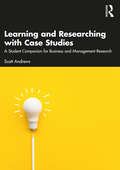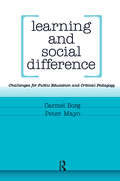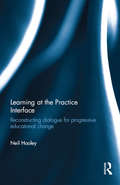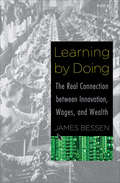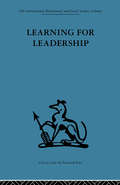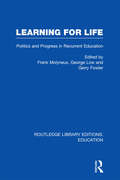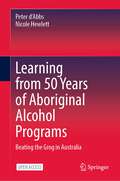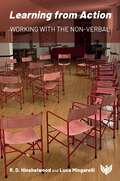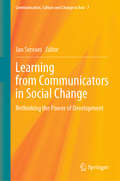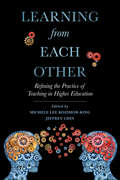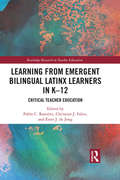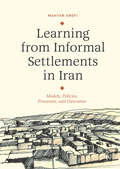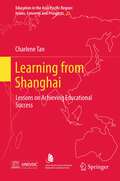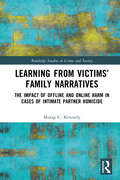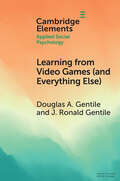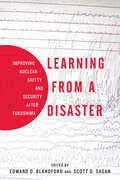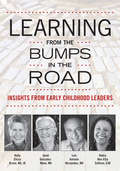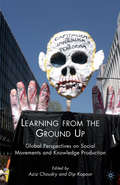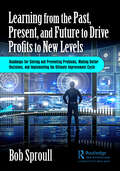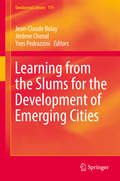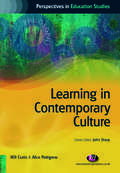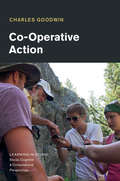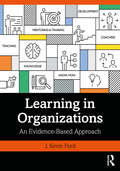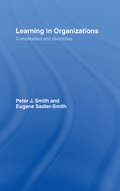- Table View
- List View
Learning and Researching with Case Studies: A Student Companion for Business and Management Research
by Scott AndrewsThis companion takes the student through the different approaches to working with cases in the classroom, virtually and for research purposes. Capturing insights and best practices shared by scholars of the case method from around the world, this book aims to: • equip students to work with and analyse case studies as part of their programme of study; • adapt student approaches to online learning with cases; • guide students on how to use case studies as a form of assessment; • help students looking to adopt a case study approach to a research project. These aims are framed in the sections of the book. Each section contains reflections from academics across the world, personal insights and lessons learnt from case sessions, templates, and exercises to develop your own skills in learning or researching with cases. Full examples showcase the nature of cases by type and format: short incident, exercise case, situation case; single, sequential and digital cases. This text is for undergraduate and postgraduate Business and Management students, those studying as part of executive education programmes, MBA students, and academics who are using or preparing to use case studies in their learning or research. Online resources include PowerPoint slides, video material and example case studies from around the world.
Learning and Researching with Case Studies: A Student Companion for Business and Management Research
by Scott AndrewsThis companion takes the student through the different approaches to working with cases in the classroom, virtually and for research purposes. Capturing insights and best practices shared by scholars of the case method from around the world, this book aims to:• equip students to work with and analyse case studies as part of their programme of study;• adapt student approaches to online learning with cases;• guide students on how to use case studies as a form of assessment;• help students looking to adopt a case study approach to a research project.These aims are framed in the sections of the book. Each section contains reflections from academics across the world, personal insights and lessons learnt from case sessions, templates, and exercises to develop your own skills in learning or researching with cases. Full examples showcase the nature of cases by type and format: short incident, exercise case, situation case; single, sequential and digital cases.This text is for undergraduate and postgraduate Business and Management students, those studying as part of executive education programmes, MBA students, and academics who are using or preparing to use case studies in their learning or research. Online resources include PowerPoint slides, video material and example case studies from around the world.
Learning and Social Difference
by Carmel Borg Peter MayoExploring how global changes affect education today, in the classroom and in local, national, and international contexts, this book explores the future of education's capacity for effectiveness in multicultural and multilingual contexts. The chapters deal with lifelong learning (a critique), immigration, antiracist education, parental involvement in schools, national curricula, Paulo Freire's legacy, insights from the work of Lorenzo Milani and the School of Barbiana, and Gramsci's writings on the school. There are both theoretical and empirically grounded chapters in this volume.
Learning at the Practice Interface: Reconstructing dialogue for progressive educational change
by Neil HooleyThis book investigates professional practice at the interface of sociology and epistemology for progressive educational change. It suggests that orthodox sociology and sociology of education have not sufficiently analysed contemporary educational situations due primarily to the strength of the economic and educational influence of neoliberalism. In drawing upon key aspects of the work of Dewey, Freire, Bernstein and Bourdieu, a new reflexive sociology of knowledge is proposed that could potentially revolutionise public schooling and emancipate learning. This critical reconceptualisation of curriculum and teaching, as well as the democratic inclusion of all children into structures of privileged and community knowledge, opens up a new epistemological stage in the sociology of education worldwide. In confronting the contradiction between social marginalisation and educational expectations, Learning at the Practice Interface explores new approaches to education systems and knowledge production. Part A raises questions regarding knowledge, pedagogy and social justice that are central to schooling and which support values weakened by neoliberalism. These values include democracy, equity, community collaboration and deference towards knowledge and culture not dependent on wealth and status. Part B explores practical issues related to how knowledge is engaged in the school curriculum. This discussion goes to the heart of learning at the practice interface and suggests that the lack of epistemological strategies based on sociological description has created serious estrangement from school knowledge for large numbers of students. Part C discusses a critical view of knowledge in relation to research, teaching and learning and the education profession generally. The need for a new reflexive sociology of knowledge is proposed to guide educational dialogue and action such that connections can be made between progressive sociology and epistemology in the interests of all children. This book will be of interest to academics and researchers in the Sociology of Education, Teacher Education, and Education Reform.
Learning by Doing: The Real Connection between Innovation, Wages, and Wealth
by James Bessen&“Bessen sets out to refute the arguments of . . . techno-pessimists, relying on economic analysis and on a fresh reading of history&” (The Wall Street Journal). Technology is constantly changing our world, leading to more efficient production. But where once technological advancements dramatically increased wages, the median wage has remained stagnant over the past three decades. Many of today&’s machines have taken over the work of humans, destroying old jobs while increasing profits for business owners and raising the possibility of ever-widening economic inequality. Here, economist and software company founder James Bessen discusses why these remarkable advances have, so far, benefited only a select few. He argues the need for unique policies to develop the knowledge and skills necessary to implement rapidly evolving technologies. Currently, this technical knowledge is mostly unstandardized and difficult to acquire, learned through job experience rather than in classrooms, but labor markets rarely provide strong incentives for learning on the job. Basing his analysis on intensive research into economic history as well as today&’s labor markets, Bessen explores why the benefits of technology can take decades to emerge. Although the right policies can hasten the process, policy has moved in the wrong direction, protecting politically influential interests to the detriment of emerging technologies and broadly shared prosperity. This is a thoughtful look at what leaders need to do to ensure success not only for the next quarter, but for society in the long term. &“Everyone agrees that education is the key to wage growth. But what kind of education? . . . This enlightening and insightful book . . . shows that economic history can provide some useful and surprising answers.&” —Hal Varian, chief economist at Google
Learning for Leadership: Interpersonal and intergroup relations
by A K RiceTavistock Press was established as a co-operative venture between the Tavistock Institute and Routledge & Kegan Paul (RKP) in the 1950s to produce a series of major contributions across the social sciences. This volume is part of a 2001 reissue of a selection of those important works which have since gone out of print, or are difficult to locate. Published by Routledge, 112 volumes in total are being brought together under the name The International Behavioural and Social Sciences Library: Classics from the Tavistock Press.Reproduced here in facsimile, this volume was originally published in 1965 and is available individually. The collection is also available in a number of themed mini-sets of between 5 and 13 volumes, or as a complete collection.
Learning for Life: Politics and Progress in Recurrent Education (Routledge Library Editions: Education)
by Frank Molyneux George Low Gerry FowlerAlthough the 1970s and 1980s witnessed a widespread reaction against investment in education there has been an extraordinary growth of interest in recurrent education. This book, sponsored by the Association for Recurrent Education, reports these considerable developments in both theory and practice in the United Kingdom and abroad. It presents a comprehensive picture of the range of initiatives and policies which are helping to make recurrent education one of the strongest sectors in contemporary education.
Learning from 50 Years of Aboriginal Alcohol Programs: Beating the Grog in Australia
by Peter d’Abbs Nicole HewlettThis open access book deals with community-based attempts on the part of Aboriginal communities and groups in Australia to address harms arising from alcohol misuse. Alcohol-related harms are viewed as both a product of colonisation and dispossession and a contributor to ongoing social, economic and health-related disadvantage, both in Australia and in other countries with colonised Indigenous populations, such as Canada, the US and New Zealand. This book contributes to an evidence-base by bringing together a selection of existing Australian documents considered by the editors to have continuing relevance to all those concerned with dealing with alcohol-related harms among Aboriginal peoples, These are contextualised in original chapters that recount key events, ideas, and programs. The book is a practical resource for all people and groups concerned with addressing Aboriginal and Torres Strait Islander alcohol-related harms, both at the community level and at the level of policy-making and administration.
Learning from Action: Working with the Non-verbal
by R. D. Hinshelwood and Luca MingarelliSince the early 1990s, Enrico Pedriali with R. D. Hinshelwood organised workshops in Italy known as the learning from action workshops. This novel approach evolved from applying the principles of therapeutic communities to a group relations form of experiential conference. The group relation tradition, however, does not focus particularly on mental health organisations and tends to focus on senior management issues of leadership and authority. In contrast, the learning from action workshops are tailored to the care workers engaged in the direct work, in particular for those working with clients and patients with significant problems with verbal and symbolic communication. The workshops also include an element of research into the unconscious messaging systems employed in making relations, which contribute to therapeutic and other mental health care services. There are also chapters on a related form of workshop - the living and learning experience - which was established primarily for learning about therapeutic communities, which bring further insight to working practices. The book brings together a community of 21 authors: Giada Boletti, Louisa Diana Brunner, Davide Catullo, Heather Churchill, John Diamond Donna M. Elmendorf, Giovanni Foresti, Rex Haigh, R. D. Hinshelwood, Yuko Kawai, Eriko Koga, Jan Lees, Simona Masnata, Luca Mingarelli, Gilad Ovadia, Mario Perini, Barbara Rawlings, Antonio Sama, Edward R. Shapiro, Lili Valko, and Zsolt Zalka. It will be a must-read for those working in mental health care. The information within will be of use to those new to the profession, for whom there is often very little preparation or reading material, and also to more senior members to use not only for their own development but also in training and research activities in mental health.
Learning from Communicators in Social Change: Rethinking the Power of Development (Communication, Culture and Change in Asia #7)
by Jan ServaesThis book presents the perspectives of some of the main players, both academics and professionals, in communication for sustainable development and social change so as to provide valuable lessons for future generations of change agents. It places emphasis on both the theoretical foundation and practical applications and ethical concerns in communication for development and social change. Most of the available historical accounts in development communications make a distinction between the modernization paradigm, the dependency paradigm and the multiplicity or participatory paradigm. These historical accounts have been dominated by framing developments within these paradigms, as the logical offspring of the Western drive to develop the world after colonization and the Second World War. The subsequent collapse of the Soviet Union in the late eighties, together with the rise of the U.S. as the only remaining ‘superpower,’ the emergence of the European Union and China, the gradual coming to the fore of regional powers, such as the BRICS countries, and the recent meltdown of the world financial system has rendered disastrous consequences for people everywhere. This book responds to these changes and challenges in presenting a rethinking of the “power” of development, and consequently the place and role of communication in it. It is aimed at both emerging research students, policymakers and social research practitioners who are interested in the history of communication for development and social change and the role and place of mayor players in it. This is most applicable to the political and educational sector, as well as scholars of history, social work, and human rights. The book will provide valuable insights for beginners in these fields who are not yet familiar with the increasingly important and emerging field of global social change.
Learning from Each Other: Refining the Practice of Teaching in Higher Education
by Michele Lee Kozimor-King Jeffrey ChinLearning from Each Other includes 20 original chapters written by well-known experts in the field of teaching and learning. Conceived for both new and experienced faculty at community colleges, four-year institutions, and research-intensive universities, the volume also addresses the interests of faculty and graduate students in programs designed to prepare future faculty and campus individuals responsible for faculty professional development. With the aim of cultivating engagement amongst students and deepening their understanding of the content, topics covered in this edited volume include:employing the science of learning in a social science contextunderstanding the effects of a flipped classroom on student successpedagogical techniques to create a community of inquiry in online learning environmentsthe risks and rewards of co-teachingreaching and teaching "non-traditional" studentsfacilitating learning and leadership in student team projectsconnecting students with the community through researchissues of assessment, including backward design, developing and using rubrics, and defining and implementing the scholarship of teaching and learningThrough Learning from Each Other, all faculty who care about their teaching, but especially faculty in the social sciences, can successfully employ curricular innovations, classroom techniques, and advances in assessment to create better learning environments for their students.
Learning from Emergent Bilingual Latinx Learners in K-12: Critical Teacher Education (Routledge Research in Teacher Education)
by Pablo C. Ramirez Christian J. Faltis Ester J. De JongIn this volume, scholars, researchers, and teacher educators from across the United States present their latest findings regarding teacher education to develop meaningful learning experiences and meet the sociocultural, linguistic, and academic needs of Latino ELLs. The book documents how teacher education programs guide teachers to engage in culturally and linguistically diverse academic contexts and sheds light on the variety of research-based theoretical frameworks that inform teaching practices. A unique contribution to the field, Learning from Emergent Bilingual Latinx Learners in K-12 provides innovative approaches for linking Latino school communities with teachers at a time when demographic shifts are considerably altering population trends in the K-12 educational system.
Learning from Informal Settlements in Iran: Models, Policies, Processes, and Outcomes
by Mahyar ArefiThis book explores the tenacity of Iran’s informal settlements against the backdrop of the World Bank’s USD 80 million loan for physical upgrading. Arefi seeks to identify and unravel the distinctive models, policies, processes, and outcomes associated with it, and explains why—despite obvious challenges—informal settlements remain popular in Iran, and also how understanding them in a broader theoretical context helps rectify existing redevelopment policies in order to develop more effective ones.
Learning from Shanghai: Lessons on Achieving Educational Success (Education in the Asia-Pacific Region: Issues, Concerns and Prospects #21)
by Charlene TanThe Shanghai school system has attracted worldwide attention since its impressive performance in the International Programme for Student Assessment (PISA) in 2009. The system ranks as a 'stunning success' according to standards of the Organisation for Economic Co-operation and Development (OECD). Shanghai also stands out for having the world's highest percentage of 'resilient students' - students from socio-economically disadvantaged backgrounds who emerge as top performers. Learning From Shanghai: Lessons on Educational Success offers a close-up view of the people and the policies that have achieved such world-class performance. Based on research and personal observation gathered during the author's recent field work with school principals, teachers and students, this book explores the factors that explain Shanghai's exceptional success in education. The approach combines high standards of scholarly research and analysis with the author's unique personal insights, as evidenced by chapters entitled Education is Filling a Bucket and Lighting a Fire and Tiger Mothers, Dragon Children. Drawing on her experience as an education professional and a teacher of teachers, Charlene Tan thoroughly examines and analyzes the people, the policies and the practices that distinguish Shanghai educators. The contents include comprehensive details on the Shanghai approach to quality education, from discussion of the balance between centralization and decentralization, to school autonomy and accountability, to testing policy and professional development for teachers. The book includes detailed tables on curriculum and school performance targets, sample appraisal forms for teachers and students, and dozens of photographs. The author is an Associate Professor at the National Institute of Education, Nanyang Technological University, Singapore.
Learning from Victims’ Family Narratives: The Impact of Offline and Online Harm in Cases of Intimate Partner Homicide (Routledge Studies in Crime and Society)
by Morag C. KennedyOffering a new perspective on intimate partner abuse and homicide, this book recognises the families of victims as legitimate agents of knowledge in terms of the harm experienced by their family members, and considers how this harm is extended to the families themselves.Examining harm from both an offline and online point of view, the book explains the multipurpose roles of offline and online harm and how these roles do not occur in isolation in terms of the victims’ and families’ abusive experiences. In doing so, it demonstrates the range of harm experienced in the context of intimate partner abuse and homicide, and outlines the overlapping nature of offline and online harm without prioritising one form of harm over the other; instead, considering the harm experienced as a continuum.Providing theoretical and empirical contributions that are largely absent from existing victimology and harm literature, Learning from Victims’ Family Narratives: The Impact of Offline and Online Harm in Cases of Intimate Partner Homicide will be of interest to scholars, researchers, students, and practitioners exploring the modern conceptualisation of harm and its impact on individuals beyond the victim and perpetrator
Learning from Video Games: The General Learning Model (Elements in Applied Social Psychology)
by Douglas A. Gentile J. Ronald GentileVideo games can have many effects on players, some of which could be intentional effects (e.g., games designed to train health compliance behaviors), and most of which are unintentional (e.g., violent games, stereotypes, gaming disorder). Some of these areas of research have been seen as controversial, but many of the controversies can be at least partially resolved by considering the learning mechanisms underlying the effects. We describe the General Learning Model in greater detail than has been provided elsewhere, including short-term and long-term mechanisms, processes of learning and forgetting, and moderators of learning. Video games use many of the best practices to train for both mastery and for transfer of learning. The implications for re-interpreting the literature on violent video games and gaming disorder, as well as for applied social psychology broadly defined, are discussed.
Learning from a Disaster: Improving Nuclear Safety and Security after Fukushima
by Scott D. Sagan Edward D. BlandfordThis book--the culmination of a truly collaborative international and highly interdisciplinary effort--brings together Japanese and American political scientists, nuclear engineers, historians, and physicists to examine the Fukushima accident from a new and broad perspective. It explains the complex interactions between nuclear safety risks (the causes and consequences of accidents) and nuclear security risks (the causes and consequences of sabotage or terrorist attacks), exposing the possible vulnerabilities all countries may have if they fail to learn from this accident. The book further analyzes the lessons of Fukushima in comparative perspective, focusing on the politics of safety and emergency preparedness. It first compares the different policies and procedures adopted by various nuclear facilities in Japan and then discusses the lessons learned--and not learned--after major nuclear accidents and incidents in other countries in the past. The book's editors conclude that learning lessons across nations has proven to be very difficult, and they propose new policies to improve global learning after nuclear accidents or attacks.
Learning from the Bumps in the Road
by Janet Gonzalez-Mena Holly Elissa Bruno Luis A. Hernandez Ed.D. Debra Ren-Etta SullivanThe journey to professional and personal growth takes time, and the road isn't always smooth, but it is a learning-filled adventureHolly Elissa Bruno, Janet Gonzalez-Mena, Luis Antonio Hernandez, and Debra Ren-Etta Sullivan are accomplished professionals and respected leaders in the early childhood field. After a decade of speaking together at national professional development conferences, they now give you twelve of their most important presentation topics as essays. Each chapter presents a dialogue among the authors about a particular topic and the lessons gleaned from facing and overcoming uncertainty and obstacles.Merging each author's distinct voice, expertise, and life experiences, this collection unveils the authors' personal and meaningful histories, insecurities, and insights. You will be encouraged and challenged to think more deeply and openly about your own practices and philosophies. You will gain a renewed sense of purpose as you help children reach their full potentials. And you will discover-as the authors did-that every bump in the road is an invitation to grow and opportunity to learn.Holly Elissa Bruno, MA, JD; Janet Gonzalez-Mena, MA; Luis Antonio Hernandez, MA; and Debra Ren-Etta Sullivan, EdD, are acclaimed keynote speakers, authors, and experts on a variety of topics in early childhood.
Learning from the Ground Up
by Aziz Choudry Dip KapoorThe dynamics, politics, and richness of knowledge production in social movements and social activist contexts are often overlooked. This book contends that some of the most radical critiques and understandings about dominant ideologies and power structures, and visions of social change, have emerged from those spaces.
Learning from the Past, Present, and Future to Drive Profits to New Levels: Roadmaps for Solving and Preventing Problems, Making Better Decisions, and Implementing the Ultimate Improvement Cycle
by Bob SproullThe content of this book is centered around three seemingly diverse themes. The first theme is why it’s so important for companies to learn from the past, the present, and the future. The author covers some of the key learnings from the distant and current past, and how these learnings changed the course for many companies. He discusses new learnings that have been developed in our current state and will continue to be brought forward. He provides a look into the future, just to make sure companies understand that they should always be looking for better ways to function. The second theme is centered around problem-solving, problem prevention, and decision-making. That is, how to successfully define problems that already exist in your current reality, how to prevent problems from occurring in the future, and how to make much more effective decisions. Problems have plagued many companies for many years and knowing how to follow a structured approach to solve them should prove to be very useful. And perhaps even more important than solving problems, is how companies can go about preventing the problems from occurring in the first place. Think about how your company might look if the plethora of problems to solve didn’t exist. And with current or potential problems, many decisions must be made. The final theme in this book is how to successfully implement the Theory of Constraints, and then combine Lean Manufacturing, Six Sigma, and the Theory of Constraints. The Theory of Constraints should be considered the "missing link" in most improvement initiatives. The author presents, in detail, why combining the Theory of Constraints with Lean and Six Sigma and all of the associated improvement tools and techniques will take your company to new levels of profitability. He introduces two new roadmaps. One roadmap is on how to implement the Theory of Constraints, while the other new roadmap is how to implement my Ultimate Improvement Cycle.
Learning from the Slums for the Development of Emerging Cities
by Jean-Claude Bolay Jérôme Chenal Yves PedrazziniThis book deals with slums as a specific question and a central focus in urban planning. It radically reverses the official version of the history of world cities as narrated during decades: slums are not at the margin of the contemporary process of urbanization; they are an integral part of it. Taking slums as its central focus and regarding them as symptomatic of the ongoing transformations of the city, the book moves to the very heart of the problem in urban planning. The book presents 16 case studies that form the basis for a theory of the slum and a concrete development manual for the slum. The interdisciplinary approach to analysing slums presented in this volume enables researchers to look at social and economic dimensions as well as at the constructive and spatial aspects of slums. Both at the scientific and the pedagogical level, it allows one to recognize the efforts of the slum's residents, key players in the past, and present development of their neighborhoods, and to challenge public and private stakeholders on priorities decided in urban planning, and their mismatches when compared to the findings of experts and the demands of users. Whether one is a planner, an architect, a developer or simply an inhabitant of an emerging city, the presence of slums in one's environment - at the same time central and nonetheless incongruous - makes a person ask questions. Today, it is out of the question to be satisfied with the assumption of the marginality of slums, or of the incongruous nature of their existence. Slums are now fully part of the urban landscape, contributing to the identity and the urbanism of cities and their stakeholders.
Learning in Contemporary Culture (Perspectives in Education Studies Series)
by Will Curtis Alice PettigrewThis book provides an accessible undergraduate-level introduction to the central educational concepts of learning and culture. In examining these themes it addresses key issues including: what is meant by ′culture′; characteristics commonly associated with contemporary culture; relationships between culture and learning; changing understandings of how, what, where and when we learn; the relationship between learning, national identity and citizenship; and the impact of all these on our way of life today. These ideas are approached from historical, philosophical, sociological, political and psychological perspectives: the traditional disciplines of Education Studies.
Learning in Doing: Co-Operative Action (Learning in Doing: Social, Cognitive and Computational Perspectives)
by Charles GoodwinCo-Operative Action proposes a new framework for the study of how human beings create action and shared knowledge in concert with others by re-using transformation resources inherited from earlier actors: we inhabit each other's actions. Goodwin uses videotape to examine in detail the speech and embodied actions of children arguing and playing hopscotch, interactions in the home of a man with severe aphasia, the fieldwork of archaeologists and geologists, chemists and oceanographers, and legal argument in the Rodney King trial. Through ethnographically rich, rigorous qualitative analysis of human action, sociality and meaning-making that incorporates the interdependent use of language, the body, and historically shaped settings, the analysis cuts across the boundaries of traditional disciplines. It investigates language-in-interaction, human tools and their use, the progressive accumulation of human cultural, linguistic and social diversity, and multimodality as different outcomes of common shared practices for building human action in concert with others.
Learning in Organizations: An Evidence-Based Approach
by J. Kevin FordLearning in Organizations: An Evidence-Based Approach examines the variety of systematic approaches and strategies for learning and development used in the workplace through the implementation of formal training, guided instruction, developmental job experiences, and self-directed learning. The hallmark of Learning in Organizations is an emphasis on research evidence of what is and is not known about learning and learning strategies and the translation of that evidence to guide best practices in workplace learning and development. The book features evidence on learning principles, new learning technologies, and strategies for developing individual, team, and leadership capabilities. The content of the chapters is enhanced by the inclusion of key learning goals for each chapter, case studies, chapter summaries, best practice recommendations, and a hands-on project for use in the classroom. Learning in Organizations provides researchers with a detailed investigation of learning practices to help drive future research. For learning practitioners, research evidence is translated into best practices that can be applied to enhance workplace learning and development. For undergraduate and graduate students, the book provides an up-to-date review of the key concepts and ways of thinking about and studying learning in the workplace.
Learning in Organizations: Complexities and Diversities
by Eugene Sadler-Smith Peter J SmithTaking a fresh and innovative approach to the complexities and challenges inherent in organizational learning diversity, the authors show that there are no generic solutions. They argue there is no 'best way' of planning, organizing and implementing learning in relation to the workplace and instead provide context-specific solutions to the dilemmas and issues that diversities present. With an international approach, grounded in theory and incorporating strong practical examples, this book is essential reading for all those studying, teaching or practising human resource development, human resource management or professional education.
